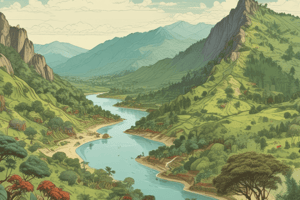Podcast
Questions and Answers
La región de Amazonas cubre el 40% del territorio de Colombia.
La región de Amazonas cubre el 40% del territorio de Colombia.
False (B)
La región Andina incluye los departamentos de Caldas y Quindío.
La región Andina incluye los departamentos de Caldas y Quindío.
True (A)
La región Caribe es la mayor región natural de Colombia.
La región Caribe es la mayor región natural de Colombia.
False (B)
La región de Orinoquía se caracteriza por tener selvas densas y ríos.
La región de Orinoquía se caracteriza por tener selvas densas y ríos.
La región Andina es la única región con terreno montañoso en Colombia.
La región Andina es la única región con terreno montañoso en Colombia.
La región de ______ cubre el 30% del territorio de Colombia.
La región de ______ cubre el 30% del territorio de Colombia.
La región Andina se caracteriza por tener ______ y geografía variada.
La región Andina se caracteriza por tener ______ y geografía variada.
La región ______ comprende las islas de San Andrés, Providencia y Santa Catalina.
La región ______ comprende las islas de San Andrés, Providencia y Santa Catalina.
La región de ______ se encuentra en la frontera con Venezuela.
La región de ______ se encuentra en la frontera con Venezuela.
La región ______ es rica en biodiversidad y recursos naturales, incluyendo oro y madera.
La región ______ es rica en biodiversidad y recursos naturales, incluyendo oro y madera.
Flashcards are hidden until you start studying
Study Notes
Regionales Naturales de Colombia
Colombia is divided into six natural regions, each with its unique characteristics, climate, and geography.
1. Amazonas Region
- Covers 35% of Colombia's territory
- Includes the departments of Amazonas, Caquetá, Guainía, Guaviare, Putumayo, and Vaupés
- Characterized by dense rainforests, rivers, and wetlands
- Home to indigenous communities and vast biodiversity
2. Andean Region
- Covers 25% of Colombia's territory
- Includes the departments of Antioquia, Boyacá, Caldas, Cauca, Cundinamarca, Huila, La Guajira, Quindío, and Risaralda
- Characterized by mountainous terrain, valleys, and snow-capped peaks
- Home to major cities, including Bogotá, Medellín, and Cali
3. Caribbean Region
- Covers 15% of Colombia's territory
- Includes the departments of Atlántico, Bolívar, Cesar, Córdoba, La Guajira, Magdalena, and Sucre
- Characterized by coastal plains, tropical savannas, and coral reefs
- Home to major ports, including Barranquilla and Cartagena
4. Orinoquía Region
- Covers 20% of Colombia's territory
- Includes the departments of Arauca, Casanare, Meta, and Vichada
- Characterized by savannas, grasslands, and tropical dry forests
- Home to cattle ranches and oil fields
5. Pacific Region
- Covers 10% of Colombia's territory
- Includes the departments of Chocó, Nariño, and Valle del Cauca
- Characterized by rugged coastlines, rainforests, and tropical wetlands
- Home to Afro-Colombian communities and major ports, including Buenaventura
6. Insular Region
- Comprises the islands of San Andrés, Providencia, and Santa Catalina
- Characterized by coral reefs, beaches, and tropical forests
- Important tourist destinations and fishing industries
Studying That Suits You
Use AI to generate personalized quizzes and flashcards to suit your learning preferences.




